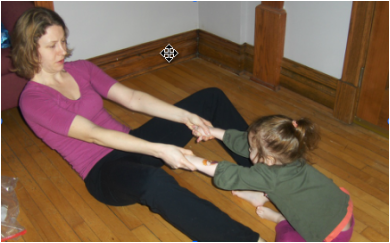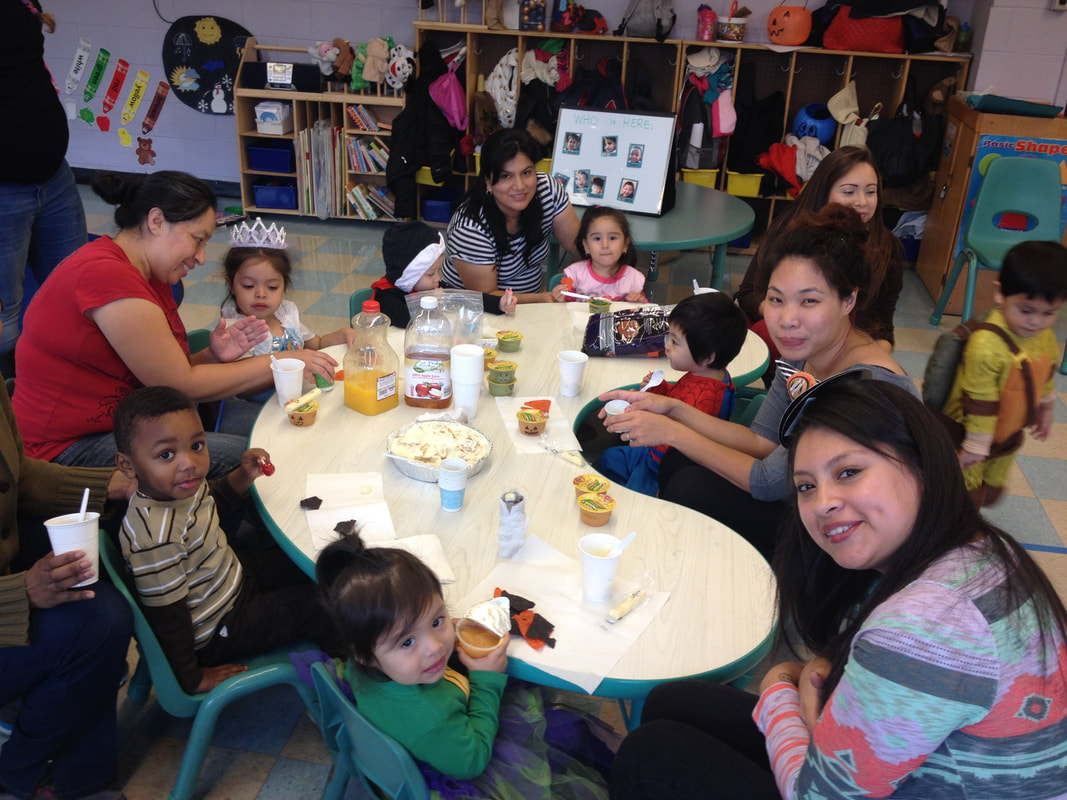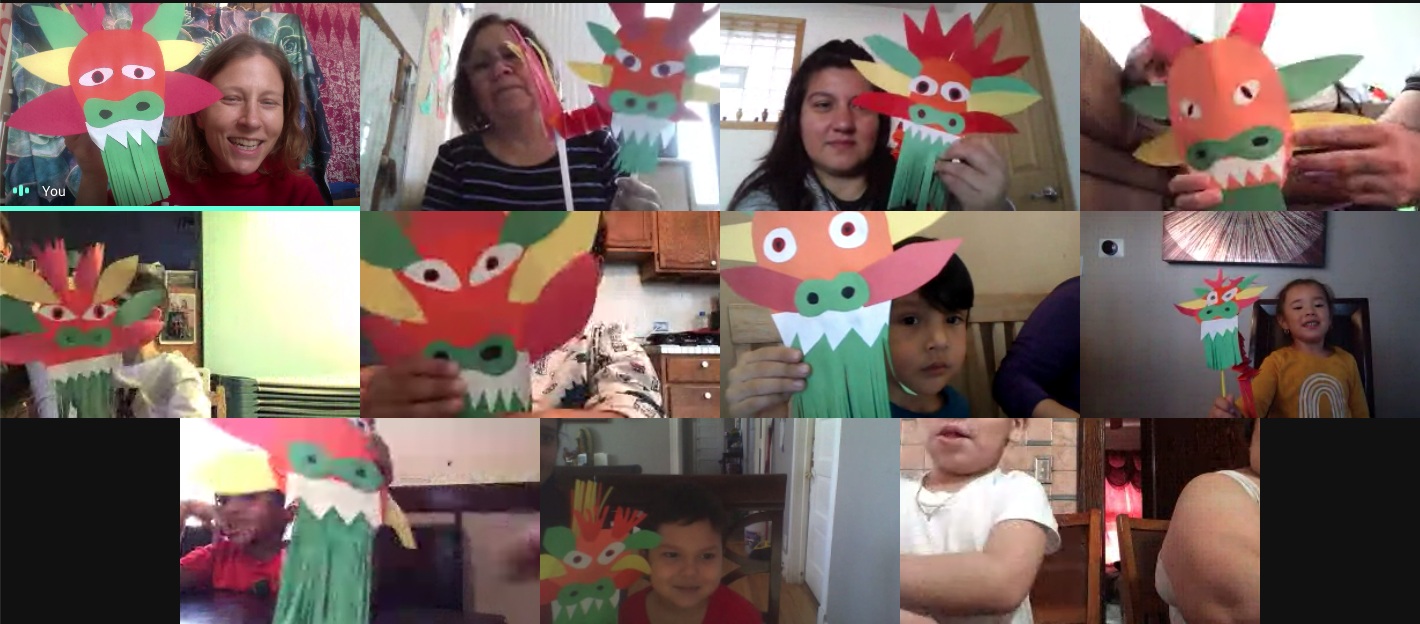"When the true leader leads, the people say, 'We did it ourselves.'”
Lao-Tzu
Lao-Tzu
Developmental Playgroups
Inclusive, Intergenerational Learning
Inclusive, Intergenerational Learning
From 2013-2015, I had the pleasure of collaborating with Albany Park Community Center's Family Literacy/ESL program, graduate student interns from the Erikson Institute, and over 20 amazing families to facilitate developmental playgroups and support groups for parents and children with and without disabilities, as well as literacy workshops for caregivers, teachers, and adult ESL students.
We created a bilingual (Spanish/English) popular education program - that is, education for the people, by the people - resulting in more confident, connected families with better access to resources. 100% of parents surveyed reported that they felt ownership of group processes, and 100% reported that the program helped prepare their children for school. We even received referrals from pediatricians who testified that the groups accelerated their patients' development and boosted parent confidence!
The groups ended due to budget and space constraints, but we miss them, and look forward to the day that we have space and funding to do intergenerational, multilingual organizing again.
We created a bilingual (Spanish/English) popular education program - that is, education for the people, by the people - resulting in more confident, connected families with better access to resources. 100% of parents surveyed reported that they felt ownership of group processes, and 100% reported that the program helped prepare their children for school. We even received referrals from pediatricians who testified that the groups accelerated their patients' development and boosted parent confidence!
The groups ended due to budget and space constraints, but we miss them, and look forward to the day that we have space and funding to do intergenerational, multilingual organizing again.
"I really liked meeting other families and talking about our concerns. We shared ideas and advice that helped to improve my relationship with my son." - Deysi
"I wish the group happened more than once a week." - Mary
"I wish the group happened more than once a week." - Mary
Check out the impact report here:
"No one educates anyone else, nor do we educate ourselves. We educate one another
in communion, in the context of living
in this world.”
Paulo Freire
in communion, in the context of living
in this world.”
Paulo Freire
Special Education
If you can teach special ed in a K-12 public school... you can do just about anything. I worked in Chicago Public Schools from 2005-2008 and 2018-2021, with many brilliant young people and their families. I wrote IEPs, collected data, conducted authentic assessments, maintained legal compliance, and applied research on behavioral science, neuroplasticity, trauma-responsive practices, and de-escalation strategies. I co-designed intricate classroom environments, sensory supports, assistive technology systems, and a soothing, regulating class culture full of music, movement, and respect for the magic of silence and rest. I also managed teams, mentored aides, assistants, and new teachers, and coordinated intervention plans with therapists - all while striving to transcend the hierarchal "supervision" role prescribed by our district via transparent, equitable communication and consensus-based decision-making.
The transition to virtual education in 2020-21 brought opportunities to collaborate more deeply with my team to cultivate greater parent involvement, providing wrap-around supports for families in crisis. We implemented new technologies, created more asynchronous resources, & adapted our curricula even further to meet the needs of little ones interfacing with education in very different ways. We co-designed inclusive outdoor events and created a mobile library & supply center.
It's hard to go back to schooling-as-usual after being part of a more authentic, dynamic, family-centered program, so I left the system. "Learning loss" is a lie. The old ways are changing. Young people and their families are learning more than ever as they adapt to a rapidly changing world. We must work together more strategically to create the world we need - a world that prioritizes equity, innovation, and self-determination for everybody.
The transition to virtual education in 2020-21 brought opportunities to collaborate more deeply with my team to cultivate greater parent involvement, providing wrap-around supports for families in crisis. We implemented new technologies, created more asynchronous resources, & adapted our curricula even further to meet the needs of little ones interfacing with education in very different ways. We co-designed inclusive outdoor events and created a mobile library & supply center.
It's hard to go back to schooling-as-usual after being part of a more authentic, dynamic, family-centered program, so I left the system. "Learning loss" is a lie. The old ways are changing. Young people and their families are learning more than ever as they adapt to a rapidly changing world. We must work together more strategically to create the world we need - a world that prioritizes equity, innovation, and self-determination for everybody.

Family-Powered
Developmental Therapy
I worked for 8 years as a developmental therapist, providing play-based therapy, social groups, assessments, adult education on developmental topics, and parent and teacher coaching in clinical, home visiting, and community settings in Chicago. Read more about my approach below - or visit my Portfolio to learn more about my approach to learning and development for adults.
You are the expert on your child - and the everyday interactions you have with your child help to wire your child's brain. As pioneering child psychiatrist Stanley Greenspan told parents, "You are not the problem. But you can be the solution." My developmental therapy coaching process incorporates deep listening to help you reflect on your parenting, and attune to the needs behind your child's behaviors. This work is rooted in Sensory Integration Theory and DIR / Floortime principles. We have to work from the bottom up - we can't improve cognitive development until we address a child's physical, sensory, emotional and regulatory needs! Through humor, play, music, movement, and subtle but powerful changes to your voice, pacing, and body language, you can help your child can grow in a natural, highly motivating context. Since every family is different, every plan is customized: from helping your child adapt to classroom and social situations, to helping you advocate for your needs at IEP and other team meetings, to creating behavioral support plans, to integrating technology like communication apps, social stories, video modeling, and visual aids - the possibilities are endless!
Developmental Therapy
I worked for 8 years as a developmental therapist, providing play-based therapy, social groups, assessments, adult education on developmental topics, and parent and teacher coaching in clinical, home visiting, and community settings in Chicago. Read more about my approach below - or visit my Portfolio to learn more about my approach to learning and development for adults.
You are the expert on your child - and the everyday interactions you have with your child help to wire your child's brain. As pioneering child psychiatrist Stanley Greenspan told parents, "You are not the problem. But you can be the solution." My developmental therapy coaching process incorporates deep listening to help you reflect on your parenting, and attune to the needs behind your child's behaviors. This work is rooted in Sensory Integration Theory and DIR / Floortime principles. We have to work from the bottom up - we can't improve cognitive development until we address a child's physical, sensory, emotional and regulatory needs! Through humor, play, music, movement, and subtle but powerful changes to your voice, pacing, and body language, you can help your child can grow in a natural, highly motivating context. Since every family is different, every plan is customized: from helping your child adapt to classroom and social situations, to helping you advocate for your needs at IEP and other team meetings, to creating behavioral support plans, to integrating technology like communication apps, social stories, video modeling, and visual aids - the possibilities are endless!
Visit my portfolio to learn more about
my approach to adult education:
my approach to adult education:




